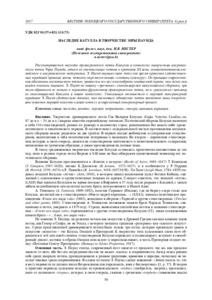Please use this identifier to cite or link to this item:
https://elib.psu.by/handle/123456789/20155Full metadata record
| DC Field | Value | Language |
|---|---|---|
| dc.contributor.author | Нестер, Н. В. | - |
| dc.date.accessioned | 2017-06-07T06:19:22Z | - |
| dc.date.available | 2017-06-07T06:19:22Z | - |
| dc.date.issued | 2017 | - |
| dc.identifier.citation | Вестник Полоцкого государственного университета. Серия A, Гуманитарные науки. - 2017. - № 2. – C. 50-54. | ru_RU |
| dc.identifier.issn | 2070-1608 | - |
| dc.identifier.uri | https://elib.psu.by/handle/123456789/20155 | - |
| dc.description | The Heritage of Catullus in the Ezra Pound’s Works N. Nestser | ru_RU |
| dc.description.abstract | Рассматривается наследие древнеримского поэта Катулла в контексте творчества американского поэта Эзры Паунда, одного из значительных поэтов и критиков XX века, основоположников английского и американского модернизма. Э. Паунд ощущал свою эпоху как время крушения художественных традиций прошлых веков, поэтому стремился заново «создать культуру». Он призывал современников обогатить англоязычную поэзию, привнеся в нее все многообразие иноязычной лирики, что делал сам, владея многими языками. Э. Паунд по-новому «прочитал» стихотворения катулловского сборника, при этом обратился не только к переводам фрагментов древнеримского поэта, но и «разместил» цитаты из стихотворений Катулла в новом контексте. Уникальным отношением к мировой литературной традиции Э. Паунд убедительно доказал, что настоящее обновление поэзии возможно лишь посредством освоения мировой классики и вовлечения ее в современный литературный процесс.= The article deals with the heritage of the Roman poet Catullus in the context of the works by the American poet Ezra Pound (1885–1972), one of the most considerable poets and critics of the twentieth century, the founders of the English and American modernism. E. Pound considered his epoch to be the time of the collapse of the artistic traditions of the past centuries, so he tried to «recreate culture». He urged his contemporaries to enrich the English poetry by bringing to it all the variety of foreign-language lyrics as he did, having a good command of many languages. E. Pound «read» Catullus’ poems in a new way. He turned to the translations of the fragments by the Roman poet’s works and he «placed» the quotations from the Catullus’ poems in a new context. With his unique relation to the world literary traditions E. Pound proved that the update of the poetry is possible only through the development of the world classics and involving it in the contemporary literature. | ru_RU |
| dc.language.iso | ru | ru_RU |
| dc.publisher | Полоцкий государственный университет | ru_RU |
| dc.relation.ispartof | Веснік Полацкага дзяржаўнага ўніверсітэта. Серыя А, Гуманітарныя навук | be_BE |
| dc.relation.ispartof | Herald of Polotsk State University Series A, Humanity sciences | en_EN |
| dc.relation.ispartof | Вестник Полоцкого государственного университета. Серия A, Гуманитарные науки | ru_RU |
| dc.relation.ispartofseries | Серия A, Гуманитарные науки;2017. - № 2 | - |
| dc.rights | open access | ru_RU |
| dc.subject | Государственный рубрикатор НТИ - ВИНИТИ::ОБЩЕСТВЕННЫЕ НАУКИ::Литература. Литературоведение. Устное народное творчество | ru_RU |
| dc.subject | Литературоведение | ru_RU |
| dc.subject | Наследие | ru_RU |
| dc.subject | Влияние | ru_RU |
| dc.subject | Перевод | ru_RU |
| dc.subject | Подражание | ru_RU |
| dc.subject | Heritage | ru_RU |
| dc.subject | Influence | ru_RU |
| dc.subject | Translation | ru_RU |
| dc.subject | Imitation | ru_RU |
| dc.title | Наследие Катулла в творчестве Эзры Паунда | ru_RU |
| dc.type | Article | ru_RU |
| dc.identifier.udc | 821'01(37)+821.111(73 | - |
| Appears in Collections: | 2017, № 2 | |
Items in DSpace are protected by copyright, with all rights reserved, unless otherwise indicated.
